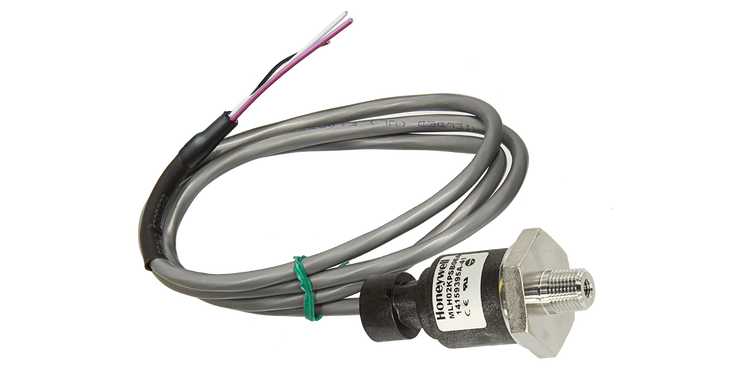More information on choosing Lambda sensors and connecting to a MoTeC ECU or Dash Logger is available in Lambda measurement.

Lambda Sensor
Accessory Details
Lambda Sensor
Accessory Details
Lambda Bung
Mild Steel Weld-In 18 x 1.5
Part No: #59001
Lambda Bung
Stainless Steel Weld-In 18 x 1.5
Part No: #59002
Connector
Bosch LSU 4.9
Part No: #64010
M800 OEM Lambda Adaptor
(300mm from OEM to DTM plug)
Part No: #61044
Lambda Sensor Extension Loom
(for NTK E1) 0.55m
Part No: #61220
Lambda Connector Kit
Bosch LSU 4.2
Part No: #64009
8 Pin Connector Kit for NTK UEGO
Female
Part No: #65042
8 Pin Connector Kit for NTK UEGO
Male
Part No: #65085
One sensor in widespread use for different applications is the K-type thermocouple. With a heat range of –200 to 1260 °C, these sensors are suitable for the hottest applications such as brake rotor and exhaust temperatures. K-type thermocouples come in either an exposed tip or an enclosed tip. Exposed tip is faster in measuring change in temperature but is more susceptible to breakage from vibration or shock waves. Enclosed tip thermocouples are more reliable but deliver a slower update rate of between three to eight times per second.
Thermocouple Temperature
Sensor Details
Thermocouple Temperature
Sensor Details
Thermocouple Temperature
Sensor Fitting and Accessory Details
Thermocouple Temperature
Sensor Fitting and Accessory Details
Compression Fitting
Designed for
1/4" (6.35mm) sensing probe
1/8 NPT threaded hole
Part No: #58050
Compression Fitting
Designed for
1/4" (6.35mm) sensing probe
1/4 NPT threaded hole
Part No: #58051
How Pressure is measured
Pressure sensors work on a differential basis by measuring the difference between the applied pressure and a reference pressure. The reference can either be absolute vacuum pressure or atmospheric (ambient air) pressure. The sensor is therefore said to measure either 'absolute' or 'gauge' pressure.
Atmospheric pressure varies constantly from place to place, moment to moment depending on ambient weather conditions. The standard atmospheric pressure is approximately equal to typical air pressure at sea level and standardised to 101.325 kPa [or 0 psi(sg), 14.7 psi(a), 1.01 bar].
Absolute Pressure
An absolute pressure sensor measures pressure relative to absolute vacuum.
A sensor held out in normal air at sea level will show around 101 kPa [14.7 psi(a), 1.01 bar].
For example, manifold pressure (MAP) sensors are absolute pressure sensors, as these sensors are required to measure pressures both below (vacuum) and above atmospheric pressure.
Gauge Pressure
Pressure can be measured relative to atmospheric pressure. This is known as gauge pressure and in technical work, should be written as psi(g).
For example the air pressure in a tire of a car, which might be said to be '30 psi', is actually 30 psi above atmospheric pressure and should be more accurately referred to as 30 psi(g).
Sealed Gauge
Sometimes the rear of a sensor is sealed to prevent contamination and improve the repeatability of readings.
The zero point of the sensor is set to standard atmospheric pressure. This may not be exactly the same pressure as where you are on any given day, resulting in offset readings. Changes in temperature and atmospheric pressure will not effect the reading from sealed gauge sensors, it is an accurate measurement of actual gauge pressure above standard atmospheric.
Sealed gauge measurements are labelled as psi(s) or psi(sg).
Pressure Sensors
MoTeC supplies a wide variety of quality pressure sensors, all of which have been tested and calibrated to suit MoTeC systems. These sensors come in a variety of pressure ranges, and can be set up within the Dash Logger or ECU to show many units, including psi(g), psi(a), kPa(g), kPa(a) and bar. Some sensors are available to suit specific applications such as Nitro methane compatible sensors.
MoTeC supplies the following types:
- Air pressure sensors
- Fluid pressure sensors
Air Pressure Sensor
Connector Details
Air Pressure Sensor
Connector Details
1 Bar MAP Sensor Connector Kit
Green
Part No: #64002
2 & 3 Bar MAP Sensor Connector Kit
Black
Part No: #64003
Fluid Pressure Sensor
Details
Fluid Pressure Sensor
Details
Fluid Pressure Sensor
Connector Details
Fluid Pressure Sensor
Connector Details
Pressure Sensor
Connector Kit
Part No: #65013
HALL SENSORS
Hall sensors contain a semiconductor Hall effect integrated circuit (IC) and a magnet. There are Hall sensor types available that can be used with a tooth (gear) style trigger wheel for measuring crank angle or wheel speed, and types that use a vaned rotor passing through a Hall sensor gap.
The IC detects changes in the field strength as the vane passes through the sensor gap or a tooth passes the sensor tip. The output voltage changes from low to high (or high to low) when the leading edge of the tooth passes the centre of the sensor.
The vane or tooth material must be magnetically soft, such as mild steel—do not use stainless steel.
MAGNETIC SENSORS
A magnetic sensor consists of a wound coil of wire that generates a voltage between the sensor wires when the magnetic field strength changes as the tooth passes the sensor. The output voltage amplitude depends on the gap between sensor and tooth and increases with increased speed past the trigger wheel.
Magnetic sensors may be used if the trigger wheel has a large number of teeth as the sensor has a small magnetic pole size. They are often used as crankshaft or wheel speed sensors.
The sensor may be wired for either a rising or falling waveform by reversing the wires. The ECU should be setup accordingly. The tooth material must be magnetically soft, such as mild steel (do not use stainless steel).
Magnetic sensors must use shielded wire to help eliminate unwanted electrical noise and must be mounted rigidly as any vibration can cause false signals.
Magnetic Sensor
Connector Details
Magnetic Sensor
Connector Details
Magnetic Sensor
Connector Kit
Part No: #64000
MAGNETIC SENSOR AMPLIFIERS
The Dual Magnetic Converter (DMC) converts magnetic style signals to open collector output signals – a square wave. This makes a typical magnetic sensor behave as a switched or Hall Effect sensor, to make the signals suitable for use with MoTeC ECUs and loggers.
This allows magnetic sensors to be used in applications where previously a Hall sensor was required, for example when using the digital inputs on an ECU to measure wheel speed.
A single DMC can convert two independent magnetic sensor signals.
The DMC comes in 4 versions, each having different trigger levels according to the requirements of the intended application.
- DMC A
This version is intended for fuel flow sensors which have a very low trigger level.
Heavy filtering minimises the possibility of interference, resulting in significant variation of the trigger level with frequency. - DMC B
This version is intended for engine trigger sensors that have insufficient amplitude to trigger a logic level input.
Minimal filtering avoids delays in the signal. The trigger level does not vary significantly at normal operating frequencies. - DMC C
This version is intended for ignition system input conditioners, typically used in drag racing, for measuring ignition timing. - DMC D
This version is intended for magnetic wheel speed sensors.
The signal should be symmetrical around zero volts.
Heavy filtering minimises the possibility of interference, resulting in significant variation of the trigger level with frequency.
Throttle Position Sensor
Connector Details
Throttle Position Sensor
Connector Details
D-Drive Throttle Position Sensor
Connector Kit
Part No: #65012
Steering Angle Sensor
Spare Part Details
Steering Angle Sensor
Spare Part Details
Steering Pulley
24 teeth
Part No: #59100
Steering Pulley
60 teeth
Part No: #59101
Steering Angle Sensor Belt
Part No: #59102
Linear Potentiometers
Details
Linear Potentiometers
Details
Linear Potentiometer Shaft
150mm, Fits #57155
Part No: #57140
Linear Potentiometer Shaft
75mm, Fits #57154
Part No: #57142
These sensors are used to measure vehicle acceleration, i.e. acceleration, braking and cornering force, which are also used for drawing track maps. 3G (+/–) sensors have a measuring range adequate for normal vehicle behaviour. Peak values in accidents require larger ranges. The signals from a G-Force sensor are normally filtered to reduce high frequency noise on the readings, resulting in more accurate vehicle G-Forces. That way we are measuring actual forces on the vehicle and not vibration or engine noise.
Inertial Measurement Units use a combination of accelerometers, gyroscopes and magnetometers to measure G forces, angular velocity and magnetic fields. In this case, each of the three parameters is triple axis, with each axis orthogonal to the others. These IMUs have been specifically developed for motorsport.

